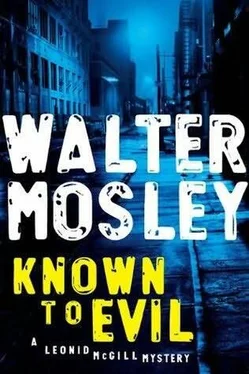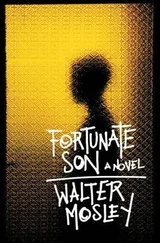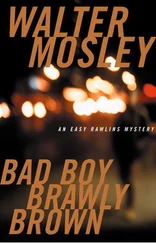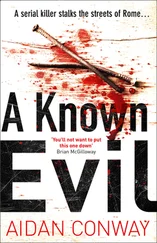"Do you expect me to believe that you haven't wondered?"
"Listen," I said. "If you come to work tomorrow and nobody in the city has committed a crime, you still get paid. You could get shot in the leg and have to take six months off and they will send you a check every two weeks. I, on the other hand, have to sweat over every dollar. I don't have time to worry about some woman who called me. I don't have the luxury to be inquisitive."
"This case has Charbon very worried," she said.
That was a threat. Captain James Charbon was oil on my water. He was my own personal ton of bricks. Kitteridge just wanted me in the jail; James Charbon wanted me under it.
"What is it you're trying to get from me?" I asked. I had to.
"Anything you know."
"Okay. I want you to listen to me. I had never heard of that woman before you told me her name. I got a call but I can't be expected to identify a dead woman's voice. Maybe if you explain to me the problem I could try to find out what you need."
"There's nothing but problems. Soa's apartment was party central. We lifted eighty-six different prints from the living room alone. On the walls, on the floors, under the couch. Women and men, maybe even children. Prints everywhere but on the knife. It was wiped off with some kind of cloth that we didn't find at the scene. The gun was gone, too."
"Do you have a scenario of how the man was killed?"
"We figure that the John Doe was pointing the gun at Wanda when someone blindsided him, stabbing him in the chest. Problem was the gun went off, killing the girl. The killer fell dead right after."
"And," I continued, "the second killer wiped their prints off the haft and then took the pistol… maybe for protection."
"That's how we see it. The guy was a professional. No ID. He didn't even have labels in his clothes."
"Not much to go on," I said.
"And if I don't come up with something you can bet that Captain Charbon will dump it on you."
"If anything comes up," I said, "anything at all, I will tell either you or Carson."
"It's my case."
"Then I'll tell you."
It was after two when I got home. I couldn't imagine subjecting myself to the test of the stairs, so I took the elevator and opened the front door quietly, hung the hideous yellow suit on the rack in my den, and then lay down on the daybed, sighing like a black bear on the first day of hibernation. I'd only had five little glasses of cognac, but at my age, and at that hour, it was enough to make the world around me jiggle and spin-on the verge of flying apart.
Bonilla presented me with a serious problem that I identified with my seemingly permanent headache.
Captain James Charbon didn't like the stink of me. He was a hardworking official who had many open cases, and so most of the time he left me alone. But when there was an investigation on his desk-one that had my name anywhere attached-he became hell-bent on getting me charged with something, anything.
This passion was brought about by extraordinary conceit.
When Charbon was a detective working the street he prided himself on a nearly perfect success rate.
I was the one exception.
A woman I knew named Lana Stride had been indicted for her involvement in the murder of a Park Avenue psychiatrist. She was guilty, the police said, of finding and giving to Brooks Sanders the name of the mental-health professional who had persuaded Brooks's wife to seek a divorce. If Lana had considered her actions she would have probably known what Brooks would do. But Lana was a lush and didn't remember what she'd done.
Sammy Stride, Lana's brother, offered me $2,500 to find Lana an alibi. It just so happened that I had once done a barely legal job for a state senator who Lana told me she knew when she was a cocktail hostess. Using the chit for a job done gratis, I asked the good legislator to tell the police, on behalf of our mutual acquaintance, that he was with her on the afternoon that Brooks had said she told him about the shrink and his wife.
State senator trumps confessed murderer 12,341 times to 1.
The senior officer on the case, James Charbon, had been looking to return the favor for seven years. From the moment he found out, from Carson Kitteridge, that I was a close confidant of Lana's brother, he made it a lifelong goal to hobble me.
Luckily I was mildly inebriated and exhausted from a frustrating day of weak leads, so Charbon felt like a faraway threat that could be managed-later.
I turned on my side.
The killing of Wanda Soa was a mistake, but it was professional, still and all. The killer had been paid by somebody. And that somebody, I was pretty sure, was not Alphonse Rinaldo. It could have been a man named Grant, who paid good money to Shad Tandy, but maybe not. Grant could have been working for Rinaldo. He might have gotten the address to be passed on to me.
I closed my eyes and lay deathlike in my wife-beater and boxers. I thought about Lizette Lear leaving her house every night for some neighborhood bar where there were cigarettes and men and alcohol, all variables in an equation that often altered but never changed.
After a night of carousing, Lizette would find herself coming back to consciousness in a hospital, the drunk tank, or, if it was a lucky night, maybe she'd awaken to nausea in her own bed. But whenever she opened her eyes, Angie would be there to wipe her face and hold her hand.
I so closely identified with the feeling that I opened my eyes to break the hermeneutic connection.
Katrina was sitting next to me in a chair that she must have pulled up. I hadn't heard the movement. I had been dreaming, not thinking.
"What's wrong?" she asked.
"Bad dream," I said.
"Why are you sleeping out here, Leonid?"
"I didn't, I didn't want to wake you."
"How do you feel?"
I sat up, experiencing a host of physical symptoms: my hands were hot, feet cold, head still hurt, and my stomach felt like a child's balloon filled with water and ready to burst.
"I'm just fine," I said.
Neither of us spoke for a time. I could hear the folding alarm clock ticking on my desk. Those were the seconds of my life creeping sideways into a vast unknown.
"I'm worried about Dimitri," Katrina said. She was worried about a lot of things, but our brooding son was always the most important.
"Not Twill?" I asked.
"Don't bait me, Leonid."
"Twilliam is the one risking getting thrown back into kid jail in order to be with his brother," I said. "He's the one taking chances."
"Dimitri is your son." It was the closest she'd ever come to admitting Twill and Shelly were other men's offspring.
"I have to lie down."
"I'm going to call the police."
"And what will you tell them?"
"That our son is missing."
"I spoke to him today."
"He hasn't talked to me."
"If you call the cops the least that will happen is that Twill will be sent back to juvie. If they're into something shaky, they both might go."
"Dimitri is a good boy," Katrina intoned.
"He's with Twill, honey, and you know what Twill is like."
Silence reigned for a while. I put a hot hand on my cold, bald, aching head.
"Come to bed," Katrina said, capitulating.
"I don't think that's a very good idea. Let me just lie back down here and I promise I will get your son to call you as soon as possible, hopefully tomorrow."
With that I lay back on the daybed, a vampire lowering into his coffin, a mummy into dust.
I WAS SICK IN the shower the next morning but stayed under the icy November waters until the hangover was filed into memory with all its hundreds of brothers.
Shelly and Katrina were still asleep when I left the apartment at 7:47.
I had fried pork chops, scrambled eggs, and two triple espressos at a diner on Fifty-seventh. The wonderful thing about knowing you won't die of old age is that you can enjoy the wrong things in life without trepidation or guilt.
Читать дальше












